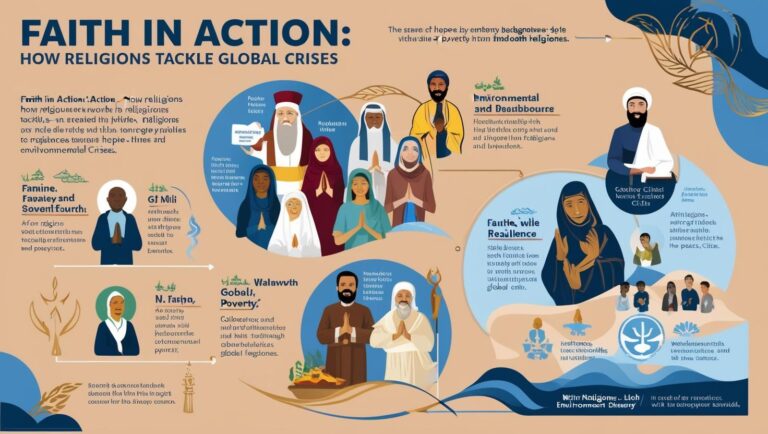In a world beset by crises—from climate change and economic instability to political upheaval and public health emergencies—religion plays a vital role that often goes unnoticed. While governments and organizations scramble to address these formidable challenges, faith communities worldwide are rolling up their sleeves and taking significant actions to make a difference. This article explores how different religions are stepping up to confront global issues and the spiritual solutions they offer.
Faith in Action: Religions Step Up in Crisis
In times of crisis, faith communities are often among the first responders, providing not only material support but also emotional and spiritual solace. Churches, mosques, temples, and synagogues are transforming into hubs of relief efforts. In many parts of the world, religious groups have launched initiatives to support those affected by natural disasters, offering shelter, food, and medical care. For instance, after Hurricane Maria devastated Puerto Rico, local churches served as emergency shelters and distribution centers, with volunteers working tirelessly to bring aid to those in need.
Furthermore, religious organizations are leveraging their networks to advocate for those who are most vulnerable. Through interfaith coalitions, they are pooling resources and amplifying their voices to demand action from policymakers. Faith leaders have been instrumental in raising awareness about crises such as the refugee plight, urging governments to adopt more compassionate asylum policies and providing direct assistance to displaced individuals and families. By mobilizing their congregations, religious groups are effectively bridging the gap between communities and authorities, ensuring that aid reaches those who need it most.
Beyond addressing immediate needs, religious communities are engaging in long-term recovery and development efforts. Many faith-based organizations focus on capacity-building initiatives that empower communities to rebuild stronger and more resilient systems. Through education, vocational training, and community development projects, they aim to create sustainable solutions that help individuals and communities thrive long after the crisis has passed. These efforts highlight the unique ability of religious groups to not only alleviate suffering but also to foster hope and resilience in the face of adversity.
Global Challenges, Spiritual Solutions
While the material contributions of faith communities are invaluable, the spiritual guidance they offer is equally significant. In times of uncertainty and fear, many turn to their faith for comfort and direction. Religious teachings provide frameworks for understanding and coping with life’s challenges, offering a source of hope and strength. For example, Buddhist principles of mindfulness and compassion provide a pathway for individuals to navigate personal and collective suffering, promoting inner peace and community solidarity.
Religions also offer rich narratives and moral imperatives that inspire action and foster a sense of duty towards others. Teachings on stewardship and responsibility for creation have mobilized faith communities to tackle environmental crises. The Pope’s encyclical, Laudato Si’, has galvanized Catholic communities worldwide to engage in environmental activism, emphasizing the moral responsibility to protect the planet for future generations. Similarly, Islamic teachings on khalifa (stewardship) encourage Muslims to be caretakers of the Earth, inspiring initiatives that promote sustainable living and conservation.
The power of collective prayer and meditation in galvanizing support and fostering unity cannot be underestimated. Multifaith prayer vigils and meditative gatherings are becoming more common as faith communities seek to foster peace and reconciliation in areas of conflict. These spiritual practices not only provide solace to those affected by crises but also serve as powerful calls to action, reminding participants of their interconnectedness and shared responsibility to work towards a more just and compassionate world.
The role of religion in addressing global crises is multifaceted and profound. From providing immediate relief and advocating for policy change to offering spiritual guidance and long-term development support, faith communities are proving to be indispensable allies in the fight against global challenges. As the world continues to face unprecedented crises, the actions and spiritual solutions offered by religious groups will remain crucial in fostering resilience, hope, and solidarity across the globe. Whether through prayer, advocacy, or hands-on service, faith in action is a force for good, proving that in times of crisis, spirituality and practicality can go hand in hand.

















